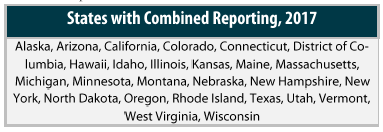 An important aspect of a 21st century tax code is ensuring that corporate income taxes are easy for corporations to follow, but not easy for them to avoid. As our newly updated policy brief on Combined Reporting of State Corporate Income Taxes explains, “combined reporting” remains an essential tool for states to achieve these goals. More than half of states with a corporate income tax now implement this common-sense policy to minimize corporate tax avoidance, and at least three more will consider adopting combined reporting this year. Moreover, most states that already require combined reporting can improve it further by taking the policy international through what is known as “worldwide combined reporting.”
An important aspect of a 21st century tax code is ensuring that corporate income taxes are easy for corporations to follow, but not easy for them to avoid. As our newly updated policy brief on Combined Reporting of State Corporate Income Taxes explains, “combined reporting” remains an essential tool for states to achieve these goals. More than half of states with a corporate income tax now implement this common-sense policy to minimize corporate tax avoidance, and at least three more will consider adopting combined reporting this year. Moreover, most states that already require combined reporting can improve it further by taking the policy international through what is known as “worldwide combined reporting.”
Combined reporting works by requiring large companies operating in multiple states to add together all the profits of their various branches and subsidiaries into one single report and then follow existing rules for apportioning those profits to the states in which they operate. Requiring the combined report nullifies certain strategies some businesses use to avoid taxes, such as artificially shifting profits to certain states that tax corporate income at a lower rate or not at all. Because combined reporting renders such strategies pointless, it improves revenue performance of the tax assuring more help to fund services like transportation, education, and public safety, while also simplifying tax compliance for businesses, as they no longer have incentive to engage in behaviors such as creating spin-off companies in new states simply to avoid the taxes they owe.
New Mexico, which has been considering bills to implement combined reporting for more than ten years, will have another chance to take this step to modernize its tax code this year. Pennsylvania’s Gov. Tom Wolf included the policy in his budget proposal earlier this month. And Alabama legislators are making a concerted push to adopt combined reporting as well. As our policy brief explains, these states and others can benefit from combined reporting, and states that have already taken this crucial step can consider additional measures to beef up their defenses against corporate tax avoidance strategies.




